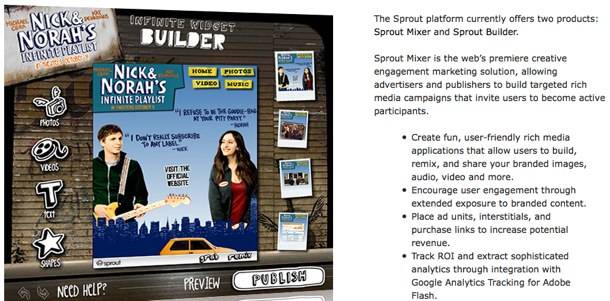Web 2.0 Called; It Says It’s Just An Ad Platform Now

When we saw drag and drop widget creation service Sprout Builder launch at the DEMO conference a year ago this month, we called it far and away our favorite company that launched there. A year later the cold reality of financial survival beckons and Sprout has announced that there is no longer any such thing as a free widget. Users will need to pay a minimum of $140 for a year of uptime for three widget projects.
It saddens us that this awesome authoring tool isn’t offering any entry level free service to allow nonprofit groups or casual widget makers a way to test the app or make quick little widgets on the fly. The company had tied making its service ad supported, but apparently the most viable interest has come from ad agencies wanting to use the service professionally. Sprout used to be an easy way for any of us to make dynamic, highly functional widgets – now it’s just for marketers who want a piece of Facebook.

We hoped that the company would be acquired by a large benefactor and kept free, or that enough widgets would proliferate to make the free service profitable. Apparently that’s not been the case.
Time and time again, many of the most innovative services online today run out of money before the huge number of potential and diverse users that could find value in them end up discovering them. Those services end up serving instead the world of advertising, or as is the case with many of the most awe inspiring research technologies – financial services professionals. We certainly don’t have anything against advertising, it pays our bills and we’d love it if you went right now to check out our advertisers, but when a really innovative technology ends up hanging a sign that says “for advertising companies only” on its door – that really rubs us wrong.
Sprout’s price sheet is hardly unreasonable for people who want to use the tool in their work, but now that it will cost you $300 a month to make more than 7 of these widgets – that’s going to cut a significant portion of potential users out of the loop. Would-be widget makers looking for something free and easy to use can check out iWidgets as one alternative, although the primary language there about monetizing your content and socializing your brand is just as vomit inducing.
Remember how the web (and “web 2.0”) were supposed to be a huge force of democratization? As we all know, time and again it turns into just another ad platform to sell lowest common denominator mass marketed commercial trash. That is really a tragedy.






















